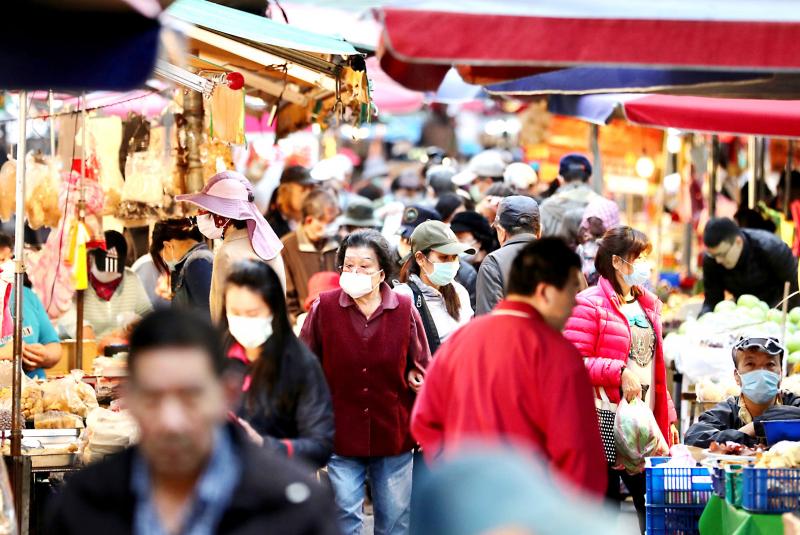The Taipei City Government yesterday started requiring people at public markets to wear a mask and have their temperature taken upon entry, but it would not issue fines, even though New Taipei City does, Taipei Deputy Mayor Vivian Huang (黃珊珊) said.
The city is to run unscheduled inspections at markets to ensure the measures are followed, which should not be a problem with Taiwan’s ample mask supply, Huang said during a site visit with Taipei Market Administration Office Director Chen Ting-hui (陳庭輝) at Guangfu Market (光復市場) in Xinyi District (信義).
The city is attempting to attract workers through the Taipei Department of Labor to perform temperature checks at market entrances, Huang said.

Photo: CNA
When asked about whether the city would follow New Taipei City, which fines vendors without a mask, Chen said no, adding that vendors in Taipei have so far been cooperative.
The New Taipei City Government on Wednesday said that market vendors who do not wear a mask at work would be fined between NT$30,000 and NT$60,000 for contravening the Act Governing Food Safety and Sanitation (食品安全衛生管理法).
However, Taipei officials are informing visitors and vendors about the rule, but would not enforce compulsory punishments, as the central government does not provide concrete guidelines for enforcement, Huang said, adding that the city would cooperate fully if it does in the future.
The city has faith that mobile vendors would follow anti-epidemic measures, as when it comes to the coronavirus, they are usually “more fearful than all of us,” since they must interact with crowds every day, she said.
Asked whether police would be dispatched to control crowds at night markets, Huang said the markets are usually in large and open spaces, so control would be limited, and it is impossible for the city government to “assign all police forces to do crowd control.”
It is important for the public and shop owners to protect themselves, too, she said, adding that people can take food home, instead of eating at night markets, to avoid crowds.

CHANGING LANDSCAPE: Many of the part-time programs for educators were no longer needed, as many teachers obtain a graduate degree before joining the workforce, experts said Taiwanese universities this year canceled 86 programs, Ministry of Education data showed, with educators attributing the closures to the nation’s low birthrate as well as shifting trends. Fifty-three of the shuttered programs were part-time postgraduate degree programs, about 62 percent of the total, the most in the past five years, the data showed. National Taiwan Normal University (NTNU) discontinued the most part-time master’s programs, at 16: chemistry, life science, earth science, physics, fine arts, music, special education, health promotion and health education, educational psychology and counseling, education, design, Chinese as a second language, library and information sciences, mechatronics engineering, history, physical education

The Chinese military has boosted its capability to fight at a high tempo using the element of surprise and new technology, the Ministry of National Defense said in the Quadrennial Defense Review (QDR) published on Monday last week. The ministry highlighted Chinese People’s Liberation Army (PLA) developments showing significant changes in Beijing’s strategy for war on Taiwan. The PLA has made significant headway in building capabilities for all-weather, multi-domain intelligence, surveillance, operational control and a joint air-sea blockade against Taiwan’s lines of communication, it said. The PLA has also improved its capabilities in direct amphibious assault operations aimed at seizing strategically important beaches,

‘MALIGN PURPOSE’: Governments around the world conduct espionage operations, but China’s is different, as its ultimate goal is annexation, a think tank head said Taiwan is facing a growing existential threat from its own people spying for China, experts said, as the government seeks to toughen measures to stop Beijing’s infiltration efforts and deter Taiwanese turncoats. While Beijing and Taipei have been spying on each other for years, experts said that espionage posed a bigger threat to Taiwan due to the risk of a Chinese attack. Taiwan’s intelligence agency said China used “diverse channels and tactics” to infiltrate the nation’s military, government agencies and pro-China organizations. The main targets were retired and active members of the military, persuaded by money, blackmail or pro-China ideology to steal

The High Prosecutors’ Office yesterday withdrew an appeal against the acquittal of a former bank manager 22 years after his death, marking Taiwan’s first instance of prosecutors rendering posthumous justice to a wrongfully convicted defendant. Chu Ching-en (諸慶恩) — formerly a manager at the Taipei branch of BNP Paribas — was in 1999 accused by Weng Mao-chung (翁茂鍾), then-president of Chia Her Industrial Co, of forging a request for a fixed deposit of US$10 million by I-Hwa Industrial Co, a subsidiary of Chia Her, which was used as collateral. Chu was ruled not guilty in the first trial, but was found guilty